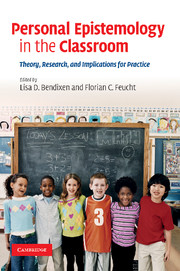Book contents
- Frontmatter
- Contents
- List of figures
- List of tables
- Contributors
- Part I Introduction
- Part II Frameworks and conceptual issues
- 2 Manifestations of an epistemological belief system in preschool to grade twelve classrooms
- 3 Epistemic climate in elementary classrooms
- 4 The integrative model of personal epistemology development: theoretical underpinnings and implications for education
- 5 An epistemic framework for scientific reasoning in informal contexts
- 6 Who knows what and who can we believe? Epistemological beliefs are beliefs about knowledge (mostly) to be attained from others
- Part III Students' personal epistemology, its development, and its relation to learning
- Part IV Teachers' personal epistemology and its impact on classroom teaching
- Part V Conclusion
- Index
3 - Epistemic climate in elementary classrooms
Published online by Cambridge University Press: 04 May 2010
- Frontmatter
- Contents
- List of figures
- List of tables
- Contributors
- Part I Introduction
- Part II Frameworks and conceptual issues
- 2 Manifestations of an epistemological belief system in preschool to grade twelve classrooms
- 3 Epistemic climate in elementary classrooms
- 4 The integrative model of personal epistemology development: theoretical underpinnings and implications for education
- 5 An epistemic framework for scientific reasoning in informal contexts
- 6 Who knows what and who can we believe? Epistemological beliefs are beliefs about knowledge (mostly) to be attained from others
- Part III Students' personal epistemology, its development, and its relation to learning
- Part IV Teachers' personal epistemology and its impact on classroom teaching
- Part V Conclusion
- Index
Summary
In today's elementary classrooms, children are expected to acquire knowledge and skills to ensure that they will be able to maintain and further the cultural, economic, and scientific accomplishments of our societies as responsible citizens. As a result, early on in their school career, elementary school students are exposed to a diversity of knowledge and skills explained to them by their teachers, systematized in curricula and syllabi, and conveyed through instruction, school books, and other educational materials.
The goal of this chapter is to consider how the actual nature of the knowledge and skills to be learned is portrayed and perceived in elementary classrooms. That is, how is the nature of knowledge and knowing presented by teachers, instruction, and educational materials? From an educational perspective, is knowledge conveyed as black-and white, stripped from its complexity and ambiguity, and assessed in a right-or-wrong fashion? From a more disciplinary perspective, are different ways of knowing along with their characteristic subjectivities and tentativeness acknowledged by teachers, instruction, and educational materials? Correspondingly, what are the beliefs of elementary school students about knowledge and knowing and are their epistemic beliefs influenced by (such) common classroom components? Do elementary students believe in the objectivity of knowledge and the existence of absolute truth? Or do they think of knowledge as being more delicate and subject to change? Taking all of these different classroom components and influences into consideration, the overarching questions of this chapter include: what is the epistemic climate of elementary classrooms, what does it look like, and what is its possible educational potential?
- Type
- Chapter
- Information
- Personal Epistemology in the ClassroomTheory, Research, and Implications for Practice, pp. 55 - 93Publisher: Cambridge University PressPrint publication year: 2010
- 34
- Cited by



